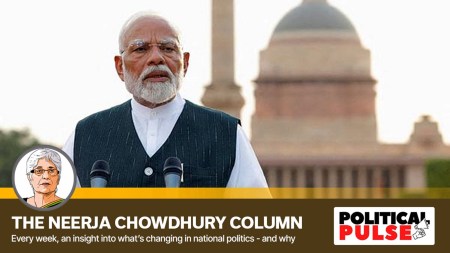
IN EMERGENCY NARRATIVE, MODI SEEKS TO NIP CONG GREEN SHOOTS IN BUD, EYES STATE POLLS
At 3 am on June 26, 1975, the police arrived at the Gandhi Peace Foundation at Delhi’s Rouse Avenue. The eeriness was broken by the bark of a stray dog in the distance and the sound of a train passing by on the railway track behind the red brick building.
The Gandhi Peace Foundation had been the hub of a movement against Prime Minister Indira Gandhi in the preceding months, the venue of strategy meetings on how to bring about a ‘Total Revolution’ led by the youth of Bihar. Just hours earlier, Jayaprakash Narayan, the face of the movement, had thundered at Ramlila Maidan, quoting words of the famous Hindi poet Dinkar, “Sinhasan khaali karo, Janata aati hai (Step down from the throne, the public is here).”
The police woke up JP, who had gone to bed very late, and asked him to come with them. “Vinaash kale vipreet buddhi (In adverse times, one loses one’s wisdom),” JP uttered only that four-word proverb. By then, the Indira Gandhi government had already arrested leading Opposition figures such as Morarji Desai, Charan Singh, Chandra Shekhar, Atal Bihari Vajpayee, L K Advani; George Fernandes had managed to escape.
Only a few months earlier, Gandhi Peace Foundation secretary K S Radhakrishna had driven JP to see Indira Gandhi. JP wanted to give her the letters his wife Prabhavati had received from Indira Gandhi’s mother Kamla Nehru, pouring her heart about the difficulties she faced in the Nehru household. He did not want those letters to fall into the “wrong hands”, hinting at Opposition leaders who were working with him. His battle against her, he said, was political, not personal.
Within hours of JP’s arrest that early June morning, press censorship kicked in and the suspension of fundamental rights, marking the start of the Emergency. The Indira Gandhi government changed the Constitution, brought in a host of laws like the Maintenance of Internal Security Act, under which the grounds for detention were not required to be provided, and extended the term of the Lok Sabha twice.
Every year, the anniversary of the Emergency is observed in a perfunctory sort of way. But this year it was marked by fireworks, with newly re-elected Prime Minister Narendra Modi invoking it, on the grounds of June 25 marking the start of 50 years since the Emergency, to bring down the rejuvenated Congress. This was just hours after Modi had sought “consensus” in running the country.
If Modi is talking about the Emergency now to counter the Congress’s claims about “defending” the Constitution, the BJP’s message has been accentuated by both Speaker Om Birla in his speech in the Lok Sabha following his re-election, and President Droupadi Murmu, in her customary address to the joint session at the start of a new Parliament.
However, it was Speaker Birla’s measure in calling for a two-minute silence in the House, to honour those who had fought the Emergency, and saying that a Lok Sabha resolution condemned what happened in 1975, which rattled the Congress. The Opposition flayed the “political” speech by Birla, whose post is meant to be non-partisan.
India has come a long way in the half-century since the Emergency. Though weakened in the 2024 polls, the BJP still forms the pole of the polity, having replaced the Congress. But the Congress is confident it is on the recovery path, as part of an Opposition front that as a whole emerged stronger in the Lok Sabha elections.
The BJP’s sharpened attack on the Emergency comes against this backdrop. Is it in anticipation that the Congress-led Opposition is moving now into a transition phase, which could take it towards a more dominant position?
What is also clear is that despite heading a coalition government, requiring him to be conciliatory towards his partners, PM Modi is unlikely to soften towards Opposition parties.
It also shows a realisation within the BJP that it needs to seize the Constitution narrative from the Congress and Opposition MPs, which held up copies of the statute as they took oath in the new Lok Sabha. The Opposition’s claim that a dominant BJP government would change the Constitution is believed to have been a factor in the party’s reverses, particularly in Uttar Pradesh and Maharashtra.
Going by the events of the last week, the functioning of Parliament is likely to remain as turbulent and contentious as in the last decade. Modi’s priority is not just keeping his government stable, but also winning states going to polls soon, including Maharashtra, Haryana, Jharkhand, Delhi and Bihar, to counter those predicting the end of “the Modi magic”.
It is also possible that with its attack over the Emergency issue, the BJP wanted to trap the Congress into a position of defending the move. However, the latter appears to have dodged that bullet, with its allies not playing by the BJP’s book despite some of them having been at the receiving end of the Emergency’s excesses. In separate news articles, RJD president Lalu Prasad (for The Indian Express) and former Congress chief Sonia Gandhi (for The Hindu) underlined that the Indira Gandhi government had paid the price for the Emergency already, and that the Modi government needed to talk about present issues.
Implicit in the Congress’s references to “undeclared emergency” during Modi’s decade-long rule is also an indirect censure of the Emergency.
For the latest news from across India, Political updates, Explainers, Sports News, Opinion, Entertainment Updates and more Top News, visit Indian Express. Subscribe to our award-winning Newsletter Download our App here Android & iOS
2024-06-30T15:38:35Z dg43tfdfdgfd